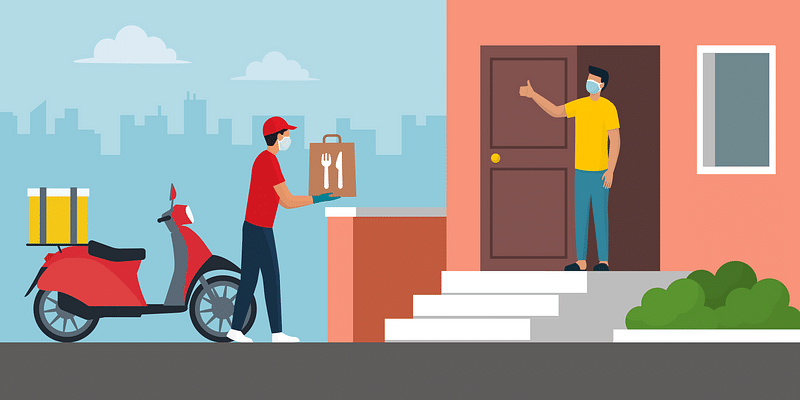“It is easy to give discounts but 30 percent off on Atta is not solving a problem for the customer!” — Anant Goel of Milkbasket
“In today’s time-crunched world where everyone wants more social and family time, we want to give customers the freedom from spending time on mundane repeat purchases. It is easy to give discounts but 30 percent off on Atta is not solving a problem for the customer!” This statement is the epithet on which Anant Goel is building Milkbasket into one of the most innovative brands in a crowded market, where few thought that innovation was a possibility.
In fact, the first time that I met Anant, I didn’t think I was going to invest in Milkbasket as it was already an overfunded category.
Innovating in an already crowded market is hard and it is not easy to find an outlier who can rise up to the challenge. However, I was impressed by the unique insights that Milkbasket presented, its focus on execution, the depth of knowledge which it had, coupled with want and conviction to succeed. I am delighted to see that Milkbasket is able to execute on its vision and create a company that has a differentiated offering, which is standing out in a well-funded category.

What this also symbolises is the extreme customer centricity, which has allowed Anant and his team to uncover nuances in customer behaviour and build a unique and innovative product addressing those needs.
Anant Goel, a 3X Entrepreneur, is the co-founder and CEO of Milkbasket. Built on the unique Indian habit of getting fresh milk delivered at home every morning, Milkbasket is fulfilling the entire grocery needs of a household every day before 7 AM. He is a firm believer that execution is the key to a startup's success. A testament to their operational excellence, Milkbasket has fulfilled in excess of 5 million orders with a 99.3 percent fulfillment rate. The industry average for other Indian ecommerce players is estimated to be 87–89 percent.
Back in August 2016, the grocery delivery space had macro-level headwinds when major grocery and hyperlocal delivery players had just gone out of business. A lot of our peers didn’t want to invest in Milkbasket, not because of their performance, but because the sector wasn’t attractive anymore. During this testing period, Milkbasket’s customers not only continued to do business with them but also pitched in with funding to save the business, when they were running out of money.
Anant set out on a journey where he met about 200 Milkbasket users over a span of 2 months and ended up raising Rs 2 crore from about 45 customers at a 3–4x valuation multiple from their last round in line with the growth of the company. This was a rousing validation of what they were doing and inspired us to believe in Milkbasket as a brand that has brought along a positive change to their customers’ lives — and can impact millions in the coming years.
Today, Milkbasket is a frontrunner in this industry. Recently, we invited Anant for a talk on what makes Milkbasket different and why it has achieved unprecedented popularity in the micro-delivery segment.
Edited excerpts:
Q. Tell us more about Milkbasket model and your overall vision for it. How did you innovate in a category where many others didn’t taste success?
Anant Goel: We want to get to a point where the customer really doesn’t have to buy from us. We want to take the burden of remembering and ordering repeat purchase items like grocery, off the list. Traditionally, hardly anyone sees their newspaper delivery man actually deliver the newspaper. That is because you don’t need to check the quality of the newspaper and you trust him to deliver it on time. This is exactly the insight on which we built our contactless delivery model, where deliveries happen between 5–7 am, which improves a customer’s experience significantly. We, in the process, save on a lot of costs that come with traditional ‘attended’ last-mile delivery where the customer physically verifies the order. This has further to be backed up with consistency and quality, something which we take very seriously.
Similarly, a prepaid, top-up payment model, where the customer recharges the wallet before placing the order, allows Milkbasket to not have any ‘checkout’ buttons on the app, unlike traditional ecommerce players. This significantly reduces the friction in the purchase experience and improves customer delight.
Q. One of the success factors of Milkbasket is the recurring order option on the platform. Tell us more about it.
AG: At a business level, customers with recurring orders, order 2X more than other users, as they order over and above the pre-set orders. About 70–75 percent of our users have at least one recurring order set on the platform. In today’s time-crunched world, where everyone wants more social and family time, we want to give the customer the freedom from spending time on mundane repeat purchases.
It is easy to give discounts but 30 percent off on atta is not solving a problem for the customer! A real-world validation of this is a Milkbasket power user who has automated almost all her household chores and hence has free time for other tasks. She has set 21 recurring orders on Milkbasket- ranging from a loaf of bread every two days to a Surf Excel every month.
Q. What are the challenges faced with recurring orders?
AG: In case of a single low-value item
As taking a recurring order is a commitment that the company makes to the customer, ensuring that the supply chain is agile and nimble is important. If there is a recurring order for Parle-G biscuits worth Rs. 5 only, the supply chain should have the capability to fulfill even a single low-value item sustainably.
In cases of stock outs/unavailability
In case of stock outs or unavailability of a certain product (especially of promised quality in case of fruits and vegetables), we let the customer know 12–18 hours in advance that we won’t be able to fulfill their order. This gives them the time to either tweak their order or make alternate plans for their purchases. We appreciate the importance of grocery in a household and hence believe its mission critical for us to be transparent.
In case of price fluctuation
By not committing to an exact advance price on certain categories, such as fruits and vegetables, we are able to pass on any price fluctuations on to the customer. This is especially important in the grocery business, where daily variables can impact prices significantly. Many other grocery players are not able to do that as they either lack the technology or the policy in this regard.
Q. Customer service is the key in hyperlocal companies. What do you do differently to stand out with regard to customer service?
AG: When the order is taken
Taking an order and not delivering is a crime, while not taking an order is ok. Our philosophy is that taking an order is creating an expectation. Don’t create an expectation that you may not be able to fulfill 100 percent. For example: If the customer wants a loaf of white bread and if we don’t have it, we would show stock out instead of taking the order and not delivering. We have realised that the customer is okay to buy a good substitute, in this case, a loaf of brown bread or a bun.
Many times in ecommerce grocery business, retailers take orders assuming that they would be able to fulfill it but ultimately may not be able to. This is where we differentiate ourselves by making sure that, what is ordered is delivered on time and in case we are not confident about delivering, we prefer to lose the sale over not meeting the customer expectation.
With the 5 million orders that we have delivered, we have been able to achieve a 99.3 percent fulfillment rate.
When the product is delivered
Secondly, it is important that things don’t get missed or spoiled during delivery. The leadership team at Milkbasket gives a lot of importance to how the product is delivered and how the supply chain works at a minimum error level. We do so with constant technology innovation to ensure that the level of tracking is increased through the entire supply chain.
In case there is an error, we have a no-questions-asked-refund-and-return-policy.
If the customer is not happy with the product, the only question we ask them is whether you would like to return it or refund it. Once that is processed, we troubleshoot and look to figure out what the problem was. This helps as the customer drops all their guards, and give us an honest bare-bones analysis on what went wrong. If the customer believes that the outcome of the return depends on the reason they give, then they are not incentivised to present an honest picture. This makes you lose out on valuable customer feedback.
This is why we say that the customer is at the centre of everything we do. We are striving towards creating great customer experience at all touch points.
Q. Milkbasket’s hybrid inventory-marketplace business model is different from other grocery and hyperlocal businesses. Tell us more about it.
AG: We don’t compare ourselves to a Hypermart, we compare ourselves to your next door mom-and-pop corner grocery store. Even with 2,000 SKUs, it magically fulfills your entire household needs. While it does not pamper you, it also does not leave you disappointed when you need something. It may not have five varieties of Kellogg’s cornflakes but it would have the highest selling flavours stocked.
On similar lines, we believe that essential items (like cornflakes, eggs, bread, ketchup or deodorant) should be inventory based and available so that it can be delivered in the morning. On the other hand, anything that we believe is more like a choice, a long tail of SKUs for customer delight, we do not stock as sales are low. For such products, we do local tie-ups where we can source products.
Q. How do you see emerging technology trends impact this business?
AG: We have a robust technology mechanism in place which is made in-house as we did not find a readymade solution for our needs. There are eight apps running in the back of the main customer-facing app. We are actively looking at incorporating Machine Learning and AI in the coming future. Machine learning will help in predicting customer consumption patterns. For example, we will know how much atta is needed in a month. So if you went for a holiday, we will know exactly after what duration you would want to reorder atta.
AI will help in bringing about further robustness in the supply chain process. A supply chain is all about manoeuvring through constraints. AI would help the pick and pack teams know exactly what to pick, from where, and in which order to pack, to maximise tribe utilisation of workforce on the floor and achieve better synchronisation amongst teams. It would further help divert the workload of the delivery teams in real time.
Q. What advice would you give entrepreneurs who starting up in a completely new category such as yourself?
AG: A lot of entrepreneurs don’t test their ideas effectively. It is best to go to complete strangers and seek feedback instead of asking friends and family. Also, sometimes founders tend to get protective and defensive about the idea. This lack of intellectual honesty deprives a founder of crucial feedback that would have otherwise helped them find a few blind spots. Secondly, don’t try to perfect the product. Get it out in the market and seek feedback.
Q. What do you do when faced with a tough task that doesn’t seem to have a solution in sight?
AG: I do three things.
- I sleep over the problem. Most of the times, when you take a decision the next day, there is a lot of clarity of thought and the decision is more balanced and rational.
- I ask myself, ‘Is this decision reversible or irreversible?’ For example, a brand proposition is an irreversible decision as it will have a lasting impact on how the consumer perceives your brand. However for smaller pilot projects, the decision can be reversible, if something doesn’t work we can always go back to the drawing board, troubleshoot and relaunch.
- I go to subject matter experts as they look at a problem differently with their vast experience and would give out-of-the-box solutions. As an entrepreneur, my job is to take the right decision based on the inputs received from various people. Whatever be your exposure and experience as an entrepreneur, one should not underestimate the power of subject matter experts.
Acknowledging Tushar Behl, Fellow at Kstart, who contributed to this article.
Disclaimers:
Kalaari is an investor in Milkbasket. Kalaari is not an investor in any other companies that may have been mentioned above. The article is strictly an independent opinion of the writer, not representative of Kstart or Kalaari.
The views and opinions expressed in this article are those of the author and do not necessarily reflect the views of YourStory.
Kalaari is an investor in YourStory.








![[Weekly funding roundup April 20-26] VC investment dips as startups resort to debt capital](https://images.yourstory.com/cs/2/220356402d6d11e9aa979329348d4c3e/funding-lead-image-1669386008401.jpg)


